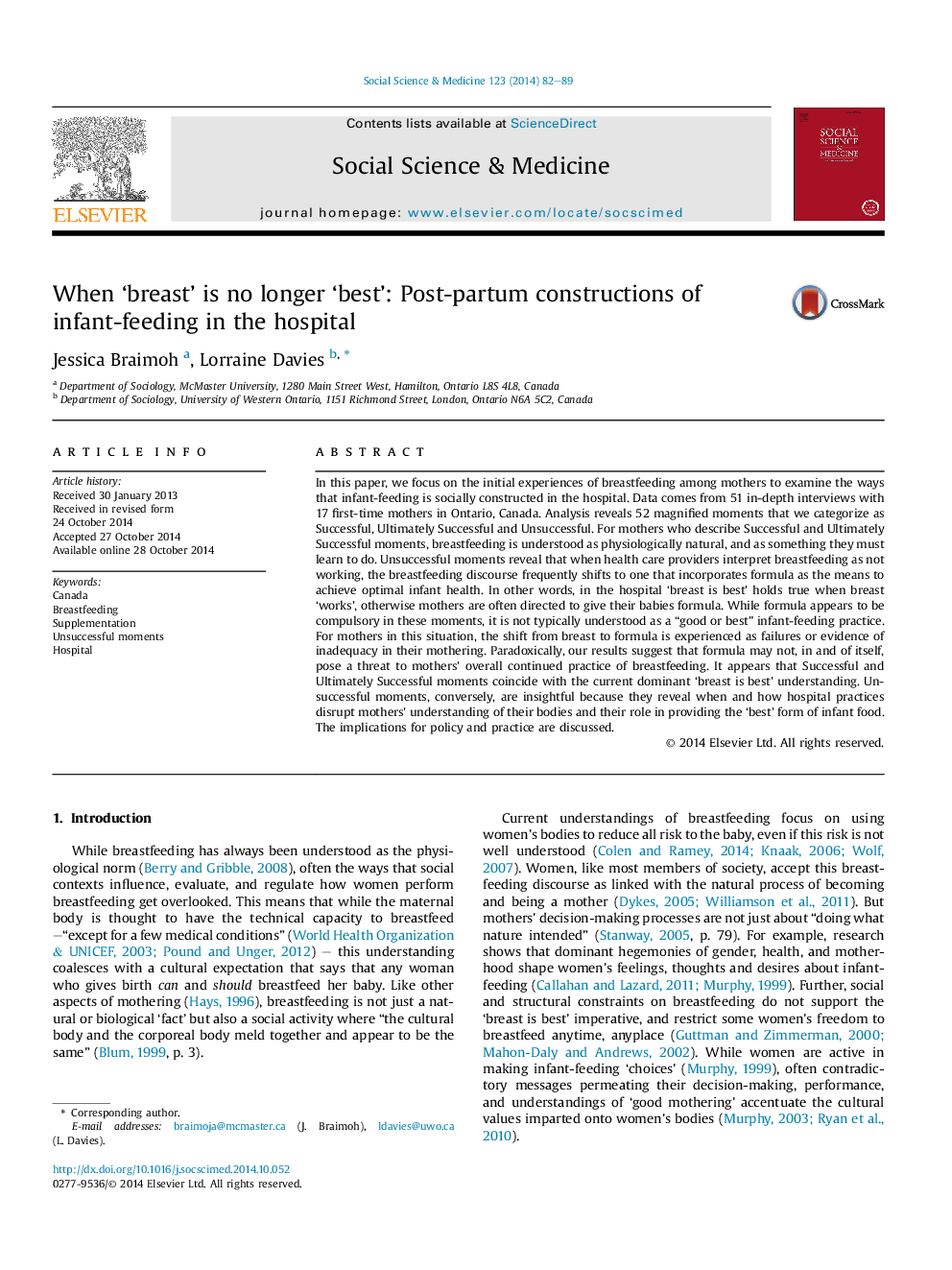| کد مقاله | کد نشریه | سال انتشار | مقاله انگلیسی | نسخه تمام متن |
|---|---|---|---|---|
| 7334052 | 1476045 | 2014 | 8 صفحه PDF | دانلود رایگان |
عنوان انگلیسی مقاله ISI
When 'breast' is no longer 'best': Post-partum constructions of infant-feeding in the hospital
ترجمه فارسی عنوان
وقتی "پستان" دیگر "بهترین" نیست: ساختارهای پس از زایمان شیرخواری در بیمارستان
دانلود مقاله + سفارش ترجمه
دانلود مقاله ISI انگلیسی
رایگان برای ایرانیان
کلمات کلیدی
کانادا، شیر دادن، مکمل لحظات ناموفق، بیمارستان،
ترجمه چکیده
در این مقاله، ما بر تجربیات اولیه تغذیه با شیر مادر در مادران تمرکز می کنیم تا شیوه های تغذیه نوزاد را به صورت اجتماعی در بیمارستان ایجاد کنیم. داده ها از 51 مصاحبه عمیق با 17 مادر اول بار در انتاریو، کانادا دریافت می شود. تجزیه و تحلیل نشان می دهد 52 لحظات افزایش یافته است که ما به عنوان موفق، در نهایت موفق و ناموفق طبقه بندی شده است. برای مادرانی که لحظات موفق و نهایت موفق را توصیف می کنند، تغذیه با شیر مادر از نظر فیزیولوژیکی طبیعی است و به عنوان چیزی که باید آن را یاد بگیرند. لحظات ناموفق نشان می دهد که وقتی که ارائه دهندگان مراقبت های بهداشتی، شستشوی شیر مادر را به عنوان کار نمی کنند، گفتمان تغذیه با شیر مادر اغلب به یکی از این فرمول ها به عنوان وسیله ای برای رسیدن به سلامت نوزاد مطلوب تبدیل می شود. به عبارت دیگر، در پستان بیمارستان "بهتر است" درست زمانی که سینه "کار می کند" درست است، در غیر این صورت مادران اغلب هدایت فرمول نوزادان خود را. در حالی که فرمول در این لحظات اجباری است، به طور معمول به عنوان "خوب یا بد" درک نمی شود تغذیه با شیر مادر برای مادران در این وضعیت، تغییر از پستان به فرمول به عنوان شکست یا شواهد عدم کفایت در مادران خود تجربه شده است. به طور متناقض، نتایج ما نشان می دهد که فرمول ممکن است به خودی خود، تهدیدی برای ادامه تمرین مادران شیرده در معرض خطر نیست. به نظر می رسد که لحظات موفق و در نهایت موفق با سنت غالب "پستان بهترین" درک است. لحظه های ناموفق، برعکس، روشنگری هستند زیرا آنها نشان می دهند که چگونه و چگونه شیوه های بیمارستان، اختلال در درک مادران از بدن و نقش آنها در ارائه بهترین شکل غذای نوزاد را مختل می کند. مفاهیم برای سیاست و عمل مورد بحث قرار گرفته است.
موضوعات مرتبط
علوم پزشکی و سلامت
پزشکی و دندانپزشکی
سیاست های بهداشت و سلامت عمومی
چکیده انگلیسی
In this paper, we focus on the initial experiences of breastfeeding among mothers to examine the ways that infant-feeding is socially constructed in the hospital. Data comes from 51 in-depth interviews with 17 first-time mothers in Ontario, Canada. Analysis reveals 52 magnified moments that we categorize as Successful, Ultimately Successful and Unsuccessful. For mothers who describe Successful and Ultimately Successful moments, breastfeeding is understood as physiologically natural, and as something they must learn to do. Unsuccessful moments reveal that when health care providers interpret breastfeeding as not working, the breastfeeding discourse frequently shifts to one that incorporates formula as the means to achieve optimal infant health. In other words, in the hospital 'breast is best' holds true when breast 'works', otherwise mothers are often directed to give their babies formula. While formula appears to be compulsory in these moments, it is not typically understood as a “good or best” infant-feeding practice. For mothers in this situation, the shift from breast to formula is experienced as failures or evidence of inadequacy in their mothering. Paradoxically, our results suggest that formula may not, in and of itself, pose a threat to mothers' overall continued practice of breastfeeding. It appears that Successful and Ultimately Successful moments coincide with the current dominant 'breast is best' understanding. Unsuccessful moments, conversely, are insightful because they reveal when and how hospital practices disrupt mothers' understanding of their bodies and their role in providing the 'best' form of infant food. The implications for policy and practice are discussed.
ناشر
Database: Elsevier - ScienceDirect (ساینس دایرکت)
Journal: Social Science & Medicine - Volume 123, December 2014, Pages 82-89
Journal: Social Science & Medicine - Volume 123, December 2014, Pages 82-89
نویسندگان
Jessica Braimoh, Lorraine Davies,
